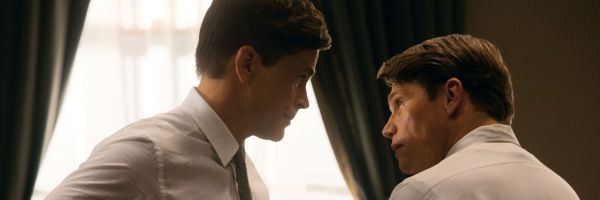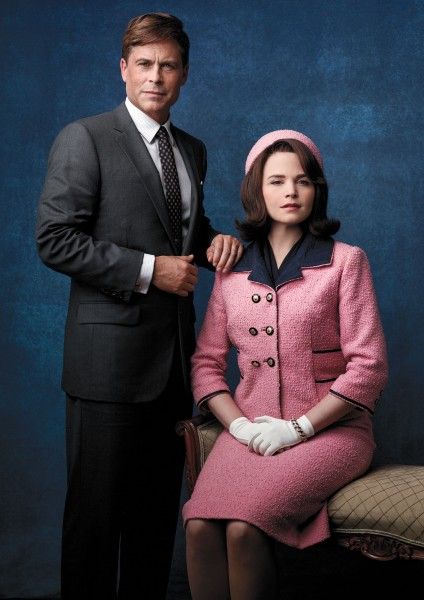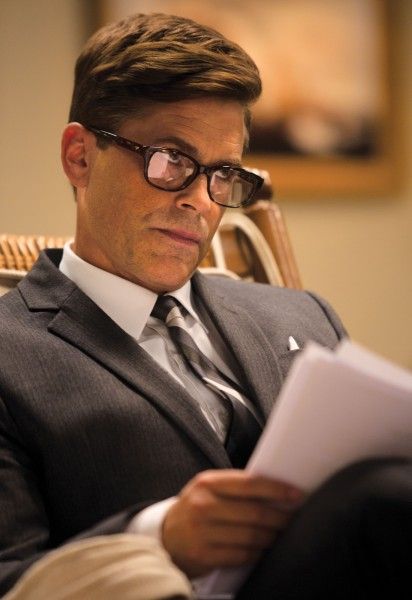Produced by Scott Free Productions and based on the best-selling book by Bill O’Reilly and Martin Dugard, National Geographic Channel’s Killing Kennedy chronicles the build-up to one of America’s most shocking events – the assassination of President John F. Kennedy by Lee Harvey Oswald. In 1959, two men faced major turning points in their lives, one in Washington, D.C., preparing to announce his presidential candidacy, and the other at the U.S. Embassy in Moscow, renouncing his American citizenship. This film charts the highs and lows of those two men, eventually intersecting with two shocking deaths that stunned a nation. It stars Rob Lowe as President John F. Kennedy and Will Rothhaar as Lee Harvey Oswald, with Ginnifer Goodwin as Jacqueline Kennedy and Michelle Trachtenberg as Marina Oswald.
During this exclusive interview with Collider, actor Rob Lowe talked about how he’d always secretly hoped to play a Kennedy someday, what finally convinced him that this was the project to do it in, the biggest challenges in bringing JFK to life without doing an imitation, how co-star Ginnifer Goodwin effected his performance, and being at a point in his career where he can be fearless in the roles he takes on. Check out what he had to say after the jump.
Collider: How did this come about for you? When you were presented with this idea, did you want to run for the hills, or were you intrigued?
ROB LOWE: I’ve always secretly hoped and suspected that someday I would play one of the brothers because I have a passing resemblance. I wanted to play them because they’re two of my heroes. I don’t think I’ve ever really had the opportunity to play a hero. I played Jesse James once, but this may be the first time I’ve played somebody I’ve admired forever. It’s been an interesting journey, for sure.
Have you always admired JFK, or did you grow to admire him, as you learned more and more about him?
LOWE: I’ve read almost everything there is to read. If a new book comes out about his administration, I’ll read it. It’s not just the iconography, which is extraordinary, and there’s never been anything like it since. The Camelot myth is romantic and amazing, but it’s really geopolitical, in what he faced, what he accomplished and what our country was, after the Eisenhower years and in the middle of the century. It was a very, very important time that’s interesting to me. I had always wanted to try to bring that to the screen.
Did you express that to the people making this, or did you hold back a bit in expressing just how much you wanted to play Kennedy?
LOWE: Because I wanted to do it, and you’re probably only gonna play JFK once in your life, you want to make sure this is the time and the place to do it. That was really the concern. And that it was Ridley Scott’s company making it, and it was based on such a huge book, and then reading the script and seeing the genius construction of the story, juxtaposing Oswald’s life and Kennedy’s life on parallel tracks. Like the iceberg in Titanic, you know they’re gonna meet and you know it’s bad. That really removed any doubt that I should do it.
Once you signed on for this and committed to playing Kennedy, what did you feel would be the biggest challenges in bringing him to life?
LOWE: I think the challenge is there for anybody playing iconic and heroic characters that people have played in the past and will play in the future, whether it’s King Lear or Romeo or JFK. It’s about, “What do you bring to it?” Unlike those characters, we know what Kennedy looked and spoke like. We don’t know what any of Shakespeare’s characters looked like, or what Arthur Miller’s characters looked like. Everybody is going to play them, but they’re gonna bring their own thing. It’s hard to do JFK because you have to embody certain elements that people come to expect, but you need to make it your own. I am a professional actor. I’m not a professional imitator. I don’t have any interest in getting him absolutely perfectly right, in every detail. I do have every interest in making him authentic and believable, and a three-dimensional man.
How did you approach finding your performance?
LOWE: I wanted to humanize him. I wanted to move behind the iconography and the hero worship, and all of our memories of that time, and really get down to the little details of a husband, a father, a brother, a complicated man, a heroic man, a flawed man, a man who did great things and wanted to do more, and was cut short. And then, what does that mean? What that means is that there’s a widow, there are children who have lost their father, and there’s a country that lost its innocence. That’s a big story. That’s what we were trying to do.
Because viewers will see the parallel between the lives of the Kennedys and the Oswalds, will there be similarities between them, as well as differences?
LOWE: That’s the ingeniousness of the storytelling construct of this. You’ll go, “Why this?” It’s because it’s the 50th anniversary and the story needs to be told. People need to have the conversation. Generations that aren’t familiar need to embrace it and learn it. Because of this interesting construct and the way this is told, I’ve never seen it done like this and it’s really compelling. It’s compelling to see Marina and Lee. He was this weird, dysfunctional cipher, and he and his wife were celebrating this amazing gift of their child while President Kennedy and Jackie were mourning the loss of their child. It shows how similar they are, and how dissimilar they are. They’re all human beings. In one day, it can all go so wrong, and we’ve never recovered from it.
What was it like to work with Ginnifer Goodwin, and how did she effect your performance?
LOWE: Well, she made it easy. She had worked the first day, and I did not. I came in and was getting make-up and hair tests. I had never met her, but Bill Paxton is one of my best friends, and he had said that I was gonna love her. She came in and she was wearing the Chanel Dallas dress with the blood on it, and it was one of the most surreal, emotional moments I have ever had, in my career. It was Jackie. She was there. I’m not an insane person. I knew it was Ginnifer Goodwin. I knew we were in a make-up trailer. And yet, a big part of me had this irrational, visceral, emotional reaction. That was the story of working with her. She just embodied Jackie.
Do you feel like you’re at a point in your career where you can be fearless in the roles that you do? Since you don’t have to prove anything anymore, does it feel like all bets are off now?
LOWE: I totally feel that way. I really do. It started around the time I wrote my book. And then, with its reception, it made me feel like now I’ve done and said everything that I’ve wanted to do, and the rest of it is now gravy. I’m playing with the House’s money. I’m just gonna swing for the fences. Behind the Candelabra was really the embodiment of that, and this is building on it. Behind the Candelabra was the character actor part of myself. The dirty little secret is that’s what I love the most. And then, Kennedy is the more traditional leading man part of myself. But, I love doing that no-holds-barred stuff that character actors get to do, all the time, and sometimes leading men are constricted by.
Killing Kennedy airs on National Geographic on November 10th.



